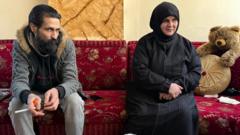In the outskirts of Damascus, Umm Mazen remains haunted by her sons' disappearances during the early protests of the Syrian civil war. Despite receiving a death certificate for her eldest, Mazen, the fate of her second son, Abu Hadi, remains unknown, swallowed by the oppressive security system of the Assad regime. Her third son, Ahmed, a victim of the regime's brutality, speaks of the tortures inflicted upon him and others in Saydnaya prison. For Umm Mazen, justice is spiritual; she wishes divine payback on those responsible and longs for a reckoning for the systemic torture suffered by countless families.
Lawyer Hussein Issa, who has spent decades fighting for the rights of those charged with political crimes, fears the continuation of a judiciary riddled with judges who enabled the regime's abuses. He voices the urgent need for a reformed judicial system to ensure that the mistakes of the past do not repeat. The challenge of delivering retrospective justice is enormous, but Issa believes that a robust legal structure is essential for the future of Syria.
Deputy Justice Minister Khitam Haddad acknowledges the temporary halt in handling past regime crimes, insisting on normalizing civil and criminal prosecutions. As concerns rise about preserving the integrity of the Bar Association amid calls for reform, lawyers warn that without careful consultation, new forms of authoritarian control could emerge. The transition toward justice remains fraught with challenges, as the remnants of the Assad-era legal framework linger, including a terrorism law that continues to impact citizens.
In a nation experiencing the tumultuous aftermath of the Assad regime's downfall, calls for justice resonate deeply. Syrians now experience freedoms previously denied, yet they remain wary of a judicial system that was once a tool of oppression. As they look toward the future, hope for accountability and true justice hangs delicately in the balance, becoming a crucial part of their collective narrative moving forward.
Lawyer Hussein Issa, who has spent decades fighting for the rights of those charged with political crimes, fears the continuation of a judiciary riddled with judges who enabled the regime's abuses. He voices the urgent need for a reformed judicial system to ensure that the mistakes of the past do not repeat. The challenge of delivering retrospective justice is enormous, but Issa believes that a robust legal structure is essential for the future of Syria.
Deputy Justice Minister Khitam Haddad acknowledges the temporary halt in handling past regime crimes, insisting on normalizing civil and criminal prosecutions. As concerns rise about preserving the integrity of the Bar Association amid calls for reform, lawyers warn that without careful consultation, new forms of authoritarian control could emerge. The transition toward justice remains fraught with challenges, as the remnants of the Assad-era legal framework linger, including a terrorism law that continues to impact citizens.
In a nation experiencing the tumultuous aftermath of the Assad regime's downfall, calls for justice resonate deeply. Syrians now experience freedoms previously denied, yet they remain wary of a judicial system that was once a tool of oppression. As they look toward the future, hope for accountability and true justice hangs delicately in the balance, becoming a crucial part of their collective narrative moving forward.




















